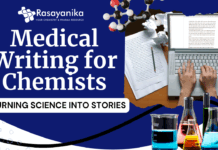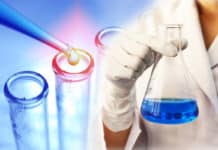Skills for Chemistry Fresher to get Jobs!
Entering the chemistry industry as a fresher can be an exciting yet challenging endeavor. The field of chemistry is vast and constantly evolving, and employers often seek candidates with a well-rounded skill set. To stand out in the competitive job market, chemistry freshers need to possess a specific set of skills that make them valuable assets to potential employers. In this article, we will explore the essential skills for Chemistry Fresher to get Jobs quickly!
Lets Get started and understand each skill requirement in detail.
a) Strong Theoretical Foundation- Skills for Chemistry Fresher to get Jobs
- Organic Chemistry:
- Organic Compounds: Organic chemistry primarily deals with carbon-containing compounds. It’s essential to learn about the various classes of organic compounds, such as alkanes, alkenes, alkynes, and aromatic compounds. Understand the structure and properties of these compounds.
- Reactions and Mechanisms: Organic reactions are at the heart of this field. Study mechanisms like substitution, addition, elimination, and rearrangement reactions. Knowing how and why these reactions occur is critical for designing synthesis routes and understanding the behavior of organic molecules.
- Stereochemistry: Stereochemistry involves the study of the spatial arrangement of atoms in molecules. Concepts like chirality, enantiomers, diastereomers, and their implications in reactions should be well-understood.
- Functional Groups: Organic compounds are categorized based on functional groups. Familiarize yourself with common functional groups like alcohols, acids, ketones, and esters, as well as their reactivity and properties.
- Synthesis Pathways: Being able to plan and execute the synthesis of complex organic molecules is a fundamental skill. Understand retrosynthesis, which involves working backward from a target molecule to simpler starting materials, and learn various synthetic strategies.
- Inorganic Chemistry:
- Principles of Inorganic Compounds: Inorganic chemistry covers a wide range of compounds, including minerals, metals, and coordination complexes. Understand the bonding theories, like valence bond theory and crystal field theory, that explain the properties of these compounds.
- Coordination Chemistry: This subfield focuses on the study of coordination compounds, where metal ions are bonded to surrounding ligands. Learn about coordination numbers, isomerism, and the different types of ligands.
- Crystallography: Crystallography is used to determine the three-dimensional arrangement of atoms in crystalline materials. Knowledge of crystallographic techniques is vital for understanding the structures of inorganic compounds.
- Periodic Trends: Understanding periodic trends like electronegativity, ionization energy, and atomic radius helps predict the properties and reactivity of elements in the periodic table.
- Physical Chemistry:
- Thermodynamics: Thermodynamics deals with energy changes in chemical processes. Study concepts like enthalpy, entropy, and Gibbs free energy to understand the spontaneity and direction of chemical reactions.
- Kinetics: Kinetics focuses on the rates of chemical reactions. Learn about reaction mechanisms, rate laws, and factors affecting reaction rates, such as temperature and catalysts.
- Quantum Mechanics: Quantum mechanics provides the theoretical framework for understanding the behavior of atoms and molecules at the quantum level. This includes concepts like wave functions, energy levels, and quantum states.
- Molecular Structure: Understand the principles of molecular geometry, bonding theories (e.g., molecular orbital theory), and spectroscopy techniques used to determine molecular structures.
- Analytical Chemistry:
- Analytical Techniques: Analytical chemistry involves methods for quantifying and identifying substances. Learn about techniques such as spectroscopy (UV-Vis, IR, NMR), chromatography (GC, HPLC), and titration methods (acid-base, redox) used to analyze chemical samples.
- Instrumentation: Familiarize yourself with the instrumentation used in analytical chemistry, including spectrophotometers, mass spectrometers, and chromatography systems. Understand how these instruments work and their applications.
- Data Analysis: Analytical chemists deal with large amounts of data. Learn statistical methods and data analysis techniques to interpret experimental results accurately.
A strong theoretical foundation in these core branches of chemistry is essential for success in the chemistry industry. It not only allows you to understand the fundamental principles of chemistry but also equips you with the knowledge and skills necessary for research, analysis, and problem-solving in various chemical fields.
b) Laboratory Techniques and Safety-Skills for Chemistry Fresher to get Jobs
- Laboratory Techniques:
- Accurate Measurement: Precise measurements are critical in chemistry. Learn to use laboratory instruments like graduated cylinders, volumetric flasks, and burettes to measure liquids accurately. Additionally, understand the proper use of balances for precise weighing of solids.
- Weighing: Accurate weighing of substances is essential for preparing solutions and conducting experiments. Familiarize yourself with analytical balances and practice techniques for properly taring and weighing substances.
- Mixing: In many experiments, you’ll need to mix substances accurately. Understand techniques such as swirling, stirring, and vortexing. Ensure that solutions are thoroughly mixed to achieve homogeneity.
- Sample Preparation: Depending on the type of analysis or experiment, you may need to prepare samples. This could involve techniques like dilution, filtration, extraction, or digestion. Proper sample preparation ensures the reliability of your results.
- Laboratory Instruments: Gain proficiency in operating and maintaining common laboratory instruments. For example, spectrophotometers are used for measuring absorbance and concentration, centrifuges for separating components of a mixture, and pipettes for accurate liquid dispensing. Proper instrument calibration and technique are vital.
- Safety Protocols:
- Chemical Hazard Awareness: Understand the hazards associated with the chemicals you’re working with. This includes knowledge of toxic, flammable, reactive, and corrosive substances. Safety data sheets (SDS) provide valuable information about chemical hazards.
- Protective Gear: Always wear appropriate personal protective equipment (PPE) in the laboratory. This typically includes lab coats, safety goggles, gloves, and closed-toe shoes. PPE helps protect you from chemical splashes, spills, and other hazards.
- Safety Protocols: Laboratories have established safety protocols and guidelines that must be followed. These include rules for handling chemicals, procedures for waste disposal, and guidelines for working with potentially hazardous materials. Complying with these protocols is crucial for your safety and the safety of others.
- Hazardous Waste Disposal: Learn the proper procedures for disposing of hazardous waste. This includes segregating waste by hazard type, using appropriate containers, and labeling waste containers correctly. Improper disposal can have serious environmental and safety consequences.
- Emergency Response: Familiarize yourself with emergency response procedures, including the location of safety showers, eyewash stations, fire extinguishers, and emergency exits. Know how to respond in case of chemical spills, fires, or personal injuries.
- Chemical Hygiene Plan: Many laboratories have a chemical hygiene plan (CHP) in place, which outlines safety practices and procedures specific to that lab. Review and adhere to the CHP of the laboratory where you work.
- Training: Ensure that you receive proper safety training before working in a laboratory setting. This includes training on the safe handling of chemicals, equipment operation, and emergency procedures. Regular safety refresher courses are also essential.
Laboratory techniques and safety are inseparable aspects of working in a laboratory. Proficiency in laboratory techniques ensures the accuracy and reliability of your experiments, while strict adherence to safety protocols and the use of appropriate protective gear are essential for your well-being and the prevention of accidents or injuries in the laboratory. Always prioritize safety and follow best practices to create a secure and efficient working environment.
c) Analytical and Critical Thinking-Skills for Chemistry Fresher to get Jobs
- Analytical Skills:
- Data Analysis: Analytical chemistry often involves collecting large sets of data from experiments, measurements, or observations. Chemists need to be proficient in data analysis, which includes organizing, processing, and interpreting data. Statistical tools, such as t-tests, ANOVA, and regression analysis, are frequently used to determine the significance of experimental results.
- Graphical Representation: Graphs and charts are powerful tools for visualizing data trends. Chemists should be skilled in creating and interpreting graphical representations like scatter plots, bar graphs, and histograms. These visuals help in identifying patterns and relationships in data.
- Error Analysis: Understanding and quantifying experimental errors is crucial. Chemists must recognize sources of error, calculate uncertainties, and assess how errors might impact the reliability of their results. This is essential for drawing accurate conclusions.
- Data Interpretation: Analytical skills extend to the ability to interpret data in the context of the research question or hypothesis. Chemists should be able to explain the implications of their findings and relate them to the broader scientific knowledge.
- Quality Control: In industry and research, chemists often work to ensure the quality and consistency of products or processes. This involves continuous monitoring and analysis of data to identify deviations and implement corrective actions.
- Critical Thinking:
- Questioning Assumptions: Critical thinking begins with questioning assumptions and preconceived notions. Chemists should approach problems with an open mind, challenging established beliefs when necessary. This can lead to innovative solutions and discoveries.
- Evaluating Evidence: Chemists must critically evaluate the evidence available to them. This involves assessing the reliability and relevance of data, experimental methods, and sources of information. It’s essential to distinguish between credible and unreliable sources.
- Hypothesis Formulation: In both experimental design and troubleshooting, critical thinking plays a pivotal role in formulating hypotheses. Chemists need to propose educated guesses about the underlying causes of observed phenomena and design experiments to test these hypotheses.
- Problem Solving: Critical thinking is fundamental to problem-solving in chemistry. When faced with unexpected results or challenges, chemists must analyze the situation, identify potential solutions, and make informed decisions based on available evidence.
- Experimental Design: Designing experiments that yield meaningful results requires critical thinking. Chemists must consider variables, controls, and potential sources of error. They also need to optimize experimental conditions to obtain the desired outcomes.
- Communication: Critical thinking extends to effective communication of scientific findings. Chemists should be able to present their work, analyze the implications of their results, and engage in discussions with colleagues to refine their hypotheses and conclusions.
Analytical and critical thinking are indispensable skills for chemists. These skills enable chemists to make sense of complex data, solve problems, and advance scientific knowledge. Whether in research, industry, or academia, chemists rely on their analytical and critical thinking abilities to navigate the intricacies of the chemical world and contribute to scientific progress.
d) Communication Skills-Skills for Chemistry Fresher to get Jobs
Effective communication is crucial in the chemistry field. Chemists must convey their findings and ideas to colleagues, superiors, and sometimes even the public. Clear and concise communication is key.
- Written & Oral Communication:
- Laboratory Reports: Chemists frequently conduct experiments and research, and they are expected to document their findings in laboratory reports. These reports should be well-structured and clearly written, detailing the purpose of the experiment, methods used, results obtained, and conclusions drawn. Proper organization and adherence to a consistent format are essential for clarity.
- Research Papers: Publishing research findings is a common practice in academia and research institutions. Chemists must be proficient in writing research papers that adhere to the conventions of scientific literature. This includes providing a comprehensive background, describing experimental procedures, presenting results with appropriate tables and figures, and discussing the implications of their work.
- Documentation: In industrial settings, chemists often need to create documentation related to product formulations, quality control processes, and safety protocols. Accurate and clear documentation is crucial for maintaining quality standards and ensuring regulatory compliance.
- Scientific Terminology: The use of precise scientific terminology is essential for effective written communication in chemistry. Chemists should be well-versed in the nomenclature and terminology specific to their field, ensuring that their writing is both accurate and comprehensible to other experts.
- Editing and Proofreading: Chemists should develop strong editing and proofreading skills to eliminate errors in their written work. Typos, grammatical mistakes, or inaccuracies can detract from the credibility of their research and reports.
- Oral Communication:
- Presentations: Chemists often need to present their work to colleagues, supervisors, and peers at conferences, seminars, or internal meetings. Effective oral communication involves structuring presentations logically, using visual aids (e.g., slides), and delivering information in a clear and engaging manner. Practice is essential for building confidence in public speaking.
- Clarity and Conciseness: When presenting complex scientific concepts, chemists should aim for clarity and conciseness. Avoid jargon or overly technical language that may confuse the audience. Use analogies or real-world examples to make the content more accessible.
- Question Handling: During presentations or discussions, chemists should be prepared to handle questions and engage in discussions about their work. This requires not only a deep understanding of the subject matter but also the ability to explain concepts and address inquiries effectively.
- Adaptability: Chemists may need to communicate their research to a diverse audience, including fellow scientists, non-experts, or even potential investors. The ability to adapt their communication style to suit the level of expertise and interests of the audience is a valuable skill.
- Feedback Reception: After presenting their work, chemists should be open to feedback and constructive criticism. This willingness to receive input and make improvements demonstrates professionalism and a commitment to continuous improvement.
- Collaboration: Effective oral communication is crucial for collaboration within research teams. Chemists must be able to discuss ideas, share progress, and coordinate efforts with colleagues to achieve research goals.
Strong communication skills are essential for chemists to convey their research findings, collaborate effectively, and advance their careers. Whether through written reports, research papers, presentations, or day-to-day interactions, clear and concise communication enhances the impact of their work and ensures that their contributions to the field of chemistry are understood and appreciated by others.
e) Computer Skills and Data Analysis-Skills for Chemistry Fresher to get Jobs
- Data Analysis:
- Data Handling: Chemists generate vast amounts of data from experiments, simulations, and observations. Proficiency in data handling is essential. This includes data entry, organization, and storage in digital formats. Software tools like Microsoft Excel are commonly used for these purposes.
- Statistical Analysis: Statistical analysis is a fundamental aspect of data interpretation in chemistry. Chemists use statistical techniques to determine the significance of experimental results, assess the reliability of data, and make informed conclusions. Common statistical tests include t-tests, ANOVA, regression analysis, and hypothesis testing.
- Graphing and Visualization: Creating clear and informative graphical representations of data is crucial for conveying findings effectively. Chemists should be skilled in using software to generate graphs, plots, and charts that visualize trends and patterns in data. Tools like GraphPad Prism or open-source alternatives can be valuable.
- Data Interpretation: Beyond statistical analysis, chemists must interpret the meaning of their data. This involves making connections between experimental results and underlying chemical principles, drawing conclusions, and identifying areas for further investigation.
- Quality Control: Data analysis is integral to quality control processes in industrial settings. Chemists use data analysis to monitor product quality, identify deviations, and implement corrective actions to maintain product consistency.
- Programming:
- Python and R: Programming languages like Python and R have become indispensable tools in chemistry. They offer extensive libraries and packages for data analysis, visualization, and scientific computing. Chemists can use these languages to automate data processing, conduct simulations, and develop models.
- Data Manipulation: Python and R provide powerful tools for data manipulation and transformation. Chemists can clean and preprocess large datasets, perform calculations, and extract meaningful information efficiently.
- Simulation and Modeling: Computational chemistry relies heavily on programming for simulating molecular structures, predicting chemical reactions, and modeling complex chemical systems. Chemists use these simulations to explore molecular interactions, discover new compounds, and design experiments.
- Custom Scripts: Chemists often encounter unique research challenges that require custom solutions. Programming skills allow them to develop specialized scripts and algorithms tailored to their specific needs.
- Integration with Instruments: In laboratory settings, programming can be used to interface with and control analytical instruments, automating data collection and analysis. This improves efficiency and reduces the potential for human error.
- Open-Source Tools: Many open-source software tools and libraries are available for chemists, making it accessible to those with limited programming experience. Learning to use and contribute to these tools can be beneficial.
In summary, computer skills and data analysis are integral to modern chemistry. Chemists who are proficient in data analysis software and programming languages like Python and R have a distinct advantage in processing and interpreting data, conducting simulations, and modeling chemical systems. These skills enhance research capabilities, improve efficiency, and contribute to the advancement of scientific knowledge in the field of chemistry.
f) Adaptability and Continuous Learning-Skills for Chemistry Fresher to get Jobs
- Continuous Learning:
- Dynamic Nature of Chemistry: Chemistry is a rapidly evolving field. New discoveries, technologies, and methodologies are constantly emerging. Chemists must stay informed about these developments to remain relevant and effective in their work.
- Scientific Journals: Regularly reading scientific journals and publications is a fundamental aspect of continuous learning. Journals provide insights into cutting-edge research, novel techniques, and breakthroughs in various subfields of chemistry. Subscribing to relevant journals and attending journal club meetings can help chemists stay updated.
- Seminars and Conferences: Attending seminars, conferences, and symposiums is an excellent way to learn about the latest advancements in chemistry. These events provide opportunities to network with peers, hear from experts, and gain exposure to diverse research areas.
- Online Courses and Workshops: Online platforms offer a plethora of courses and workshops in chemistry-related topics. Chemists can take advantage of these resources to expand their knowledge and acquire new skills. Many courses offer flexibility, allowing professionals to learn at their own pace.
- Advanced Degrees and Certifications: Pursuing advanced degrees (e.g., master’s or Ph.D.) or specialized certifications can be a significant step in continuous learning. These educational pathways provide in-depth knowledge and open up opportunities for research and leadership roles in academia and industry.
- Professional Organizations: Joining and actively participating in chemistry-related professional organizations can provide access to resources, networking opportunities, and avenues for continuous learning. These organizations often host webinars, workshops, and educational events.
- Adaptability:
- Embracing Emerging Technologies: Chemistry is becoming increasingly interdisciplinary, with advancements in fields like materials science, nanotechnology, and computational chemistry. Chemists should be open to adopting new technologies and methodologies, such as high-throughput screening, machine learning, and automation, to enhance their research capabilities.
- Experimental Techniques: Adaptability extends to the laboratory. Chemists should be willing to explore and implement new experimental techniques and equipment that can improve the efficiency and accuracy of their work. This might involve learning to operate specialized instrumentation or adopting innovative sample preparation methods.
- Regulatory Changes: In industrial settings, chemists may need to adapt to changes in regulations and compliance standards. Staying informed about evolving safety and environmental regulations is essential to ensure that laboratory practices remain in compliance.
- Interdisciplinary Collaboration: Adaptability also involves collaborating with experts from other disciplines. Chemistry often intersects with biology, physics, engineering, and environmental science. Chemists who can collaborate effectively across these boundaries can tackle complex problems more comprehensively.
- Problem-Solving: Chemists encounter unexpected challenges and anomalies in their research. Being adaptable means approaching these situations with a flexible mindset, identifying alternative solutions, and learning from failures or setbacks.
- Professional Growth: Adaptability can lead to career growth. Chemists who demonstrate the ability to adapt to new roles, responsibilities, and challenges are often seen as valuable assets in research, industry, and academia.
In summary, adaptability and continuous learning are indispensable qualities for success in the dynamic field of chemistry. Chemists who commit to lifelong learning and embrace change are better equipped to contribute to scientific advancements, solve complex problems, and excel in their careers. These qualities not only benefit individual chemists but also contribute to the progress of the field as a whole.
g)Teamwork and Collaboration-Skills for Chemistry Fresher to get Jobs
- Interpersonal Skills:
- Effective Communication: Effective teamwork begins with communication. Chemists must be able to express their ideas clearly and listen actively to their colleagues. This includes the ability to articulate complex scientific concepts in a way that is understandable to team members with diverse backgrounds.
- Respect for Diverse Viewpoints: Chemistry projects often involve individuals with different expertise and perspectives. Chemists should respect and appreciate these differences, recognizing that diverse viewpoints can lead to more creative solutions and a broader understanding of complex problems.
- Conflict Resolution: Conflicts may arise during collaborative projects. Chemists should have the skills to address conflicts constructively, seeking compromises and solutions that benefit the team and the project’s objectives. Conflict resolution is essential for maintaining a positive working environment.
- Empathy and Cultural Sensitivity: In multinational and multicultural research teams, chemists should demonstrate empathy and cultural sensitivity. Understanding cultural nuances and respecting the diverse backgrounds of team members fosters a more inclusive and productive collaborative environment.
- Leadership and Followership: Effective teamwork often requires both leadership and followership. Chemists should be prepared to take on leadership roles when their expertise aligns with the project’s needs, while also being willing to support others when their expertise is better suited to a particular task.
- Project Collaboration:
- Clearly Defined Roles: In collaborative research projects, it’s essential to have clearly defined roles and responsibilities for each team member. This minimizes confusion, ensures that everyone knows their tasks, and promotes accountability.
- Effective Communication: Frequent and transparent communication is vital for project success. Chemists should regularly update their team members on progress, challenges, and results. This includes sharing data, protocols, and experimental findings in a timely manner.
- Goal Alignment: Team members should have a shared understanding of the project’s goals and objectives. This ensures that everyone is working toward a common purpose and helps in making decisions that are in the best interest of the project.
- Resource Management: Collaboration often involves sharing resources, such as equipment, reagents, or laboratory space. Chemists should be responsible stewards of these resources, ensuring they are used efficiently and shared equitably among team members.
- Data Sharing and Integration: In interdisciplinary projects, chemists may collaborate with experts from other fields. They should be prepared to integrate their data and findings with those of their colleagues from different disciplines, creating a holistic view of the project.
- Project Coordination: Coordinating complex projects involves setting timelines, monitoring progress, and adapting to changing circumstances. Chemists should be skilled in project management techniques to ensure that the project stays on track.
- Mutual Support: Chemists should be willing to offer assistance and support to their team members when needed. Collaboration thrives when team members are willing to help one another overcome challenges and collectively achieve success.
In summary, teamwork and collaboration are essential skills in the field of chemistry, where multidisciplinary projects are common. Chemists who excel in these areas can harness the collective expertise and creativity of a diverse team to solve complex scientific problems and drive innovation. Effective collaboration not only benefits individual research or projects but also contributes to the advancement of science as a whole.
In summary, acquiring and honing these essential skills is paramount for chemistry freshers aiming to enter the industry and secure job opportunities quickly. A strong theoretical foundation provides the intellectual framework needed to understand and contribute to the field’s advancements. Practical skills, such as laboratory techniques and safety protocols, enable you to work effectively and safely in a lab setting.
Analytical and critical thinking skills empower you to solve complex problems and make meaningful contributions to scientific research. Effective communication, both written and oral, ensures that your findings and ideas are conveyed clearly and persuasively.
Remember that securing a job in the chemistry industry may take time and persistence. It’s important to stay motivated and continue building your skills while actively seeking opportunities. By combining a solid foundation of knowledge with these essential skills, you’ll be well-prepared to embark on a successful and fulfilling career in the dynamic world of chemistry. Keep learning, growing, and applying your expertise, and you’ll undoubtedly make a meaningful impact in the field.

















































